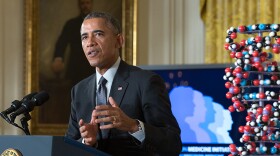We're having a cerebral week: we contemplate replacing race in healthcare with genetic analysis, and dropping "abuse" from the language of addiction. Also, experts make cases for fewer drugs for teen depression, and more diverse lab mice. Plus, doctors get nasty on Yelp.
Precision Medicine's Post Racial Promise
A patient's race can offer clues to what diseases she might be at higher risk for (think sickle cell anemia, Tay-Sachs), or which medications may be more or less effective. But it's an imperfect measure: we often know less about our ancestry than we think. Precision medicine offers a better way of learning about genetic factors in Americans' health...as long as minorities don't get left behind, says Atlantic writer Van R. Newkirk II. Read the article.
Study: Most Anti-Depressants Don't Work On Kids And Teens
The vast majority of children do not need to be medicated for their depression, the researchers concluded, yet many are. Unfortunately, alternatives are not always available. From STAT News, Karen Weintraub reports.
Lab Mice Should Be More Like People, Scientists Say
Lab mice tend to be young, lean, and genetically similar to those around them. St. Louis University cancer researchers say using more diverse mice would help them figure out what cures might work on different patients. From St. Louis Public Radio, Durrie Bouscaren has more.
Docs Strike Back On Yelp, With A Vengeance
Dear reader, we hope this never happens to you! We're pretty sure most health providers wouldn't dream of doing this, but there are some meanies out there who are spilling patients' medical information in response to negative reviews. ProPublica reporter Charles Ornstein analyzed Yelp's vast archive. Here's what he found.
Should "Abuse" Be Eliminated From The Language On Addiction?
Research shows that the word "abuse" carries more stigma than "disorder" - even among mental health professionals. And it's scientifically inaccurate to boot, says Harvard addiction expert John Kelly. So is it time to let "abuse" go? From WHYY's The Pulse, Elana Gordon has more.










